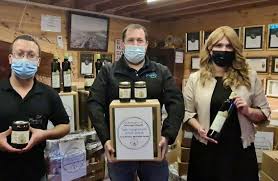“This is a historic day for Samaria and the entire State of Israel,” said Samaria Regional Council head Yossi Dagan.
By TOVAH LAZAROFF

(photo credit: SAMARIA REGIONAL COUNCIL)
The Samaria Regional Council began exporting settler products to the United Arab Emirates on Sunday with labels stating that Israel is the country of origin.
A shipment of olive oil and honey from the Tura Winery in the Rehelim settlement and Paradise Honey in the Hermesh settlement will be exported.
“This is a historic day for Samaria and the entire State of Israel,” said Samaria Regional Council head Yossi Dagan, who was photographed holding a box that said “Tura Winery, Rehelim, Israel.”
The ability of the settlers to export products to the UAE, which are treated as “made in Israel” items, is seen as a small step forward toward de facto sovereignty and recognition that the settlements are indeed part of Israel.
Most of the international community refuses to recognize the settlements, holding that areas outside of the pre-1967 lines, such as the settlements, cannot be considered part of Israel.
This is expressed in the treatment of Israeli products produced over the pre-1967 lines, particularly by Europe, one of Israel’s largest trading partners.
One of the major battles of the settlement movements has been over their right to claim that their products should be considered part of Israel, even if they are produced in an area that is under IDF control but outside of the country’s sovereign borders.
United Nations Security Council Resolution 2334, approved in 2016, asked all UN member states to distinguish in their dealings between areas of Israel within the pre-1967 lines and those outside.
The UN Human Rights Council last year produced a “black list” of companies located in Jewish areas over the pre-1967 lines, such as the West Bank settlements, and companies that do business with Jewish entities in those areas.
The European Union has issued guidelines for consumer labeling of settler products to ensure that it is clear that they were not made in Israel. Its European Court of Justice ruled in 2019 that Israeli products produced over the pre-1967 lines could not be labeled “made in Israel.
“The Trump administration changed its labeling guidelines on this score, issuing a declaration that settlement products can be labeled “made in Israel,” after US Secretary of State Mike Pompeo made the first visit ever to a settlement entity in the West Bank. He visited the Psagot Winery in the Sha’ar Binyamin Industrial Park in mid-November, 2020.
The Trump administration recognized the legitimacy of the settlements but halted plans to allow Israel to annex them in exchange for normalization deals with the UAE and Bahrain.
The UAE has not distinguished in its business dealings with Israel, however, when it comes to areas over the pre-1967 lines, including the export of settlement products.
In December, Dagan led a business delegation from Samaria to the UAE to hold meetings with the UAE distribution company FAM Holding. The delegation held a brief ceremony with CEO Dr. Faisal Ali Mousa to mark the new partnership.
On Sunday, that partnership went into action, including with plans for the marketing of wine.
Vered Ben Saadon, whose family owns Tura Winery, said that their wine has “always connected people” and that the UAE-Israel partnership is a “wonderful opportunity to connect nations.”
Matan Paradise, whose family owns Paradise Honey, said that he was “happy to export to Dubai” and looked forward to expanding cooperation in the future.
Source: The Jerusalem Post

Leave a Reply